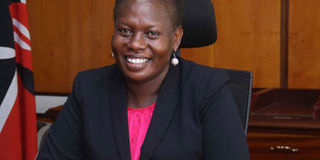Good attitude, training will change services in the ministry of Lands

Lands Cabinet Secretary Farida Karoney at her Ardhi House office in Nairobi on February 19, 2018. PHOTO | FILE | NATION MEDIA GROUP
What you need to know:
- Even in the dreaded Lands Department, there are some honest and reliable clerks and professionals.
- It is good to appreciate the current commitment and efforts towards the digitisation of records and computerisation of processes.
- It is true that newly-recruited officers seldom benefit from structured induction and mentoring.
- At the technical level, officers need an appreciation of the guiding policy, constitutional and legal frameworks that drive the sector.
Many service seekers in the Lands Ministry probably assume that all officers are unfriendly rent seekers. But that is not true! There are indeed some good hardworking officers who, despite the daily drama and intrigues in Lands, are fairly level-headed and professional while serving Kenyans.
I have met them in the Planning Department and at the Survey of Kenya. Even in the dreaded Lands Department, there are some honest and reliable clerks and professionals. But, proportionately, they are few and most are afraid to speak out. As a result, they are not able to effectively influence policy and practice.
While seeking routine services, I have met newly-recruited officers who do not find anything odd in getting late to work or even snubbing customers when in office. Their mobile phones receive more attention than customers, and seemingly without regret.
SERVICE RENDERED
Then there is this rather surprising attitude of playing boss to all service seekers, and imagining that there must be something in it for them for any service rendered. And this cuts through most offices in the head office as well as counties, and even the land commission.
The land commission surprises a lot more since it was meant to have pre-vetted new staff. But there isn’t much difference. Indeed, some think the commission is a lot worse. This poor attitude and behaviour has continued to tarnish the image and name of the Lands Ministry and the omission, the two key institutions responsible for managing access to and protection of land rights in Kenya. Besides, land transactions end up negatively affected.
It is good to appreciate the current commitment and efforts towards the digitisation of records and computerisation of processes.
CUSTOMER AGONY
Automated processes cut down on human interaction and should ultimately reduce timelines and customer agony.
Ongoing efforts to shuffle ministry staff as reported recently in the media are encouraging but not enough.
Some of the rather innocent looking junior and middle level officers not targeted for movements easily help to continue old practices.
And the integrity of computer processes revolves around data input, updates and protection.
With unreliable, low-integrity workers at the controls, computer services and results are easily manipulated.
The bottom line for the improvement of services in all service points therefore depends on a focused, motivated, well-inducted, informed and supervised staff.
CUSTOMER FEEDBACK
And they must be routinely held to account on the basis of targets and customer feedback. But are they? Anecdotal surveys and experience reveal not.
At one time I sought to find out from a clerk what the timeline for processing simple sub-division survey record was and got the curt response: “What is that?” It is on public record too that one of the previous Cabinet Secretaries got rudely surprised to find that land registrars on duty were not equipped with the new Constitution and land laws while on a routine visit to one of the county offices.
So then they cannot be apt! I have not met anyone in the Planning, Lands or Survey offices at any one time agonising that they have not met their targets, something I remember used to happen in the Ministry as a matter of routine in the past. Meeting targets would ultimately influence an officer’s stagnation or upward mobility.
MENTORING
It is also true that newly-recruited officers seldom benefit from structured induction and mentoring. Instead, they are left to learn by observation and intuition. Little wonder they make avoidable mistakes, quickly embrace rent-seeking and have a poor appreciation of the guiding policy, laws and procedures.
They are left to get their way around without guidelines and mentors to rely on. That is why I at times shake my head in surprise at some of the things they do. One appreciates that they must have missed out on fundamental guidance.
One also gets the impression that no matter what money or equipment we throw at Lands, we will continue to face fundamental challenges on attitudes, style, quality and accountability, as long as we leave the human resource base without a central guiding compass; a compass that ensures that every new officer understands the ethics, standards, customer attitudes and accountability expected of them.
GUIDING POLICY
At the technical level, officers need an appreciation of the guiding policy, constitutional and legal frameworks that drive the sector.
This could be ensured through structured induction courses for the newly-recruited and a subsequent mentoring programme in each department.
Technical officers need regular refresher courses to bring them abreast with operational policies and laws and their periodic amendments.
They need to understand the changing regional and global policies and their implications to our national space. And all the officers must be kept accountable to targets and performance through a consistent reward and punishment mechanism.
Mr Mwathane is a surveyor. [email protected]





